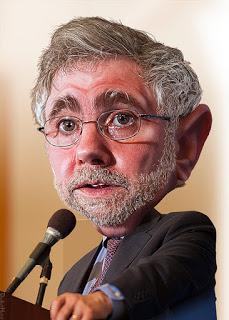 One of the biggest differences between Democrats and Republicans is over how to treat the giant financial organizations on Wall Street. The Republicans would deregulate those institutions completely, while Democrats believe they must be regulated to protect consumers (and prevent crashes like those that tanked the economy in 1929 and 2007).
One of the biggest differences between Democrats and Republicans is over how to treat the giant financial organizations on Wall Street. The Republicans would deregulate those institutions completely, while Democrats believe they must be regulated to protect consumers (and prevent crashes like those that tanked the economy in 1929 and 2007).Both Hillary Clinton and Bernie Sanders talked about their plans for Wall Street during the debate last Tuesday -- with both in favor of more sensible regulations. Here is what Nobel Prize-winning economist Paul Krugman has to say in his New York Times column after listening to the debate:
Hillary Clinton and Bernie Sanders had an argument about financial regulation during Tuesday’s debate — but it wasn’t about whether to crack down on banks. Instead, it was about whose plan was tougher. The contrast with Republicans like Jeb Bush or Marco Rubio, who have pledged to reverse even the moderate financial reforms enacted in 2010, couldn’t be stronger.
For what it’s worth, Mrs. Clinton had the better case. Mr. Sanders has been focused on restoring Glass-Steagall, the rule that separated deposit-taking banks from riskier wheeling and dealing. And repealing Glass-Steagall was indeed a mistake. But it’s not what caused the financial crisis, which arose instead from “shadow banks” like Lehman Brothers, which don’t take deposits but can nonetheless wreak havoc when they fail. Mrs. Clinton has laid out a plan to rein in shadow banks; so far, Mr. Sanders hasn’t.
But is Mrs. Clinton’s promise to take a tough line on the financial industry credible? Or would she, once in the White House, return to the finance-friendly, deregulatory policies of the 1990s?
Well, if Wall Street’s attitude and its political giving are any indication, financiers themselves believe that any Democrat, Mrs. Clinton very much included, would be serious about policing their industry’s excesses. And that’s why they’re doing all they can to elect a Republican.
To understand the politics of financial reform and regulation, we have to start by acknowledging that there was a time when Wall Street and Democrats got on just fine. Robert Rubin of Goldman Sachs became Bill Clinton’s most influential economic official; big banks had plenty of political access; and the industry by and large got what it wanted, including repeal of Glass-Steagall.
This cozy relationship was reflected in campaign contributions, with the securities industry splitting its donations more or less evenly between the parties, and hedge funds actually leaning Democratic.
But then came the financial crisis of 2008, and everything changed.
Many liberals feel that the Obama administration was far too lenient on the financial industry in the aftermath of the crisis. After all, runaway banks brought the economy to its knees, causing millions to lose their jobs, their homes, or both. What’s more, banks themselves were bailed out, at potentially large expense to taxpayers (although in the end the costs weren’t very large). Yet nobody went to jail, and the big banks weren’t broken up.
But the financiers didn’t feel grateful for getting off so lightly. On the contrary, they were and remain consumed with “Obama rage.”
Partly this reflects hurt feelings. By any normal standard, President Obama has been remarkably restrained in his criticisms of Wall Street. But with great wealth comes great pettiness: These are men accustomed to obsequious deference, and they took even mild comments about bad behavior by some of their number as an unforgivable insult.
Furthermore, while the Dodd-Frank financial regulation bill enacted in 2010 was much weaker than many reformers had wanted, it was far from toothless. The Consumer Financial Protection Bureau has proved highly effective, and the “too big to fail” subsidy appears to have mostly gone away. That is, big financial institutions that would probably be bailed out in a future crisis no longer seem to be able to raise funds more cheaply than smaller players, perhaps because “systemically important” institutions are now subject to extra regulations, including the requirement that they set aside more capital.
While this is good news for taxpayers and the economy, financiers bitterly resent any constraints on their ability to gamble with other people’s money, and they are voting with their checkbooks. Financial tycoons loom large among the tiny group of wealthy families that is dominating campaign finance this election cycle — a group that overwhelmingly supports Republicans. Hedge funds used to give the majority of their contributions to Democrats, but since 2010 they have flipped almost totally to the G.O.P.
As I said, this lopsided giving is an indication that Wall Street insiders take Democratic pledges to crack down on bankers’ excesses seriously. And it also means that a victorious Democrat wouldn’t owe much to the financial industry.
If a Democrat does win, does it matter much which one it is? Probably not. Any Democrat is likely to retain the financial reforms of 2010, and seek to stiffen them where possible. But major new reforms will be blocked until and unless Democrats regain control of both houses of Congress, which isn’t likely to happen for a long time.
In other words, while there are some differences in financial policy between Mrs. Clinton and Mr. Sanders, as a practical matter they’re trivial compared with the yawning gulf with Republicans.
(The caricature of Paul Krugman above is by DonkeyHotey.)

